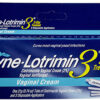Gyne-Lotrimin, also known as clotrimazole, is an antifungal medication commonly used to treat various types of fungal infections in the vagina. It belongs to the azole antifungal class of drugs and works by inhibiting the growth of fungi.
This medication is available in the form of creams, suppositories, and tablets, offering different options for administration. It is typically used for the treatment of vaginal yeast infections caused by Candida albicans, but it may also be prescribed for other fungal infections.
Avoiding Risks with Gyne-Lotrimin
While Gyne-Lotrimin is generally a safe medication, there are certain circumstances where its use may not be recommended. Contraindications to taking Gyne-Lotrimin include:
- Hypersensitivity to clotrimazole or any of its components
- Presence of an untreated or underlying condition that requires different treatment
Gyne-Lotrimin Reactions
Like any medication, Gyne-Lotrimin can cause some side effects, although not everyone experiences them. Possible side effects include:
- Itching and irritation at the site of application
- Burning sensation or redness
- Abdominal cramps
- Vaginal discharge or discomfort
If any of these side effects persist or worsen, it is advisable to consult a healthcare professional.
Usage Instructions
Gyne-Lotrimin should be used as directed by a healthcare professional or as indicated on the packaging. The typical recommended dosage and duration of treatment may vary depending on the severity of the infection. It is essential to follow the complete treatment course, even if symptoms improve.
If a dose is missed, it should be taken as soon as remembered. However, if it is almost time for the next scheduled dose, the missed dose should be skipped to avoid a double dose. Doubling the dose to make up for a missed one is not recommended.
An overdose of Gyne-Lotrimin is unlikely to occur; however, if accidentally ingested, it is important to seek medical attention or contact a poison control center immediately.
Drug Combinations
There are currently no known significant interactions between Gyne-Lotrimin and other medications. However, it is always important to inform the healthcare professional about all the medications, including prescription, over-the-counter, and herbal supplements, being taken in order to avoid potential drug interactions.
Gyne-Lotrimin: Inquiry and Response
- Q: Can I use Gyne-Lotrimin during pregnancy?
- Q: Can Gyne-Lotrimin be used to treat infections in men?
- Q: How long does it take for Gyne-Lotrimin to show improvement?
- Q: Can I use Gyne-Lotrimin if I am breastfeeding?
- Q: Can I use Gyne-Lotrimin if I have my period?
A: It is generally safe to use Gyne-Lotrimin during pregnancy; however, it is recommended to consult with a healthcare professional before using any medication during pregnancy.
A: Gyne-Lotrimin is primarily formulated for vaginal use and may not be suitable for treating fungal infections in men. It is advisable to consult a healthcare professional for appropriate treatment options for male fungal infections.
A: The improvement of symptoms varies from person to person. Typically, relief from symptoms can be observed within a few days of starting Gyne-Lotrimin; however, it is important to complete the full course of treatment as prescribed.
A: It is unlikely that Gyne-Lotrimin passes into breast milk. However, it is advisable to consult a healthcare professional before using any medication while breastfeeding.
A: It is generally safe to use Gyne-Lotrimin during menstruation; however, it is important to follow the instructions provided and consult a healthcare professional if unsure.


Reviews
There are no reviews yet.